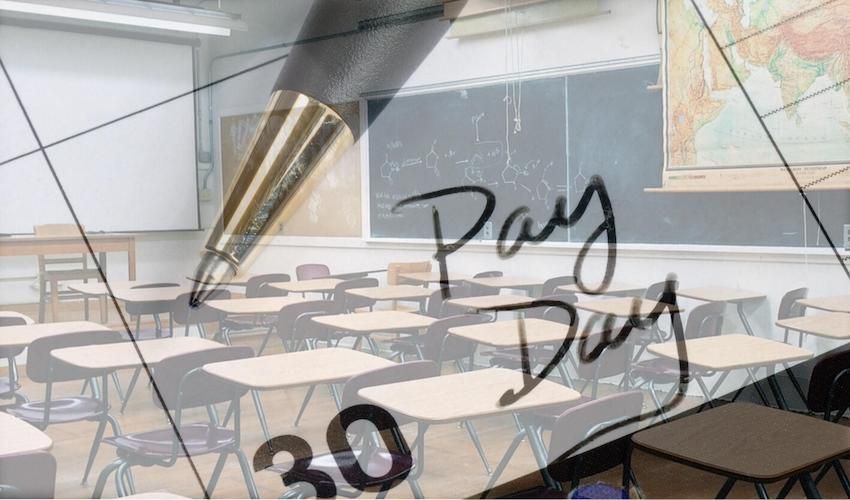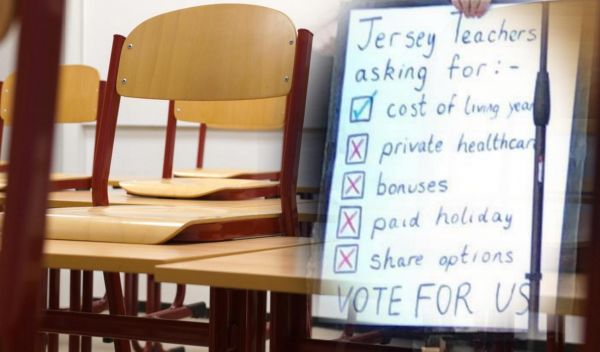

Aggrieved professionals striking in the Royal Square, disgruntled parents making emergency arrangements for children at home, politicians trying to balance books which already project a shortfall – no-one is content with the current fall-out over teachers’ pay.
But, as government and unions remain tight-lipped about the progress of negotiations, the question ‘what do teachers actually earn?’ is not as simple as you might think.
As the wage war rages on and the protracted public sector dispute remains unresolved after a ten-month impasse with unions and the employer giving vastly different accounts of how negotiations are progressing, Express takes a closer look into teacher pay…
Although the government publishes teachers’ salaries online, what an individual working in a particular school can expect to earn varies substantially according both to their experience and any additional responsibilities they are prepared to take on. Ultimately, there’s no simple formula you can apply.
Pictured: The row over teacher pay has seen hundreds of aggrieved education professionals resorting to industrial action.
To begin with the easy part – the salary scale has 15 levels, or 14 if you set aside level one which is for teachers in the process of gaining their teaching qualification. Those who have just qualified – NQTs or newly qualified teachers – will start on level 2 (£35,975) or level 3 (£38,306), depending on their other qualifications.
From there, teachers progress through a series of annual increments. These aren’t automatic, but - assuming a satisfactory level of performance - they are effectively guaranteed.
Working up from level three, there are 12 steps to the top of the scale where the salary is £53,078, according to the 2019 figures. So, a qualified teacher who has been in the profession for 13 or 14 years will be earning this amount, assuming that they haven’t agreed to take on further responsibility.

Pictured: "What an individual working in a particular school can expect to earn varies substantially..." (gov.je).
An interesting statistic in the information released by government in April shows that only 19.8% of teachers earn less than £50,000, reflecting the relative experience of Jersey’s professionals and/or the willingness of younger teachers to take on additional responsibility to push up their salaries.
It’s that additional responsibility which makes calculating a teacher’s total salary more complicated because those responsibilities bring with them supplementary allowances and almost six-out-of-ten teachers receive at least one of these.
Perhaps surprisingly, these supplementary allowances do not correspond exactly to specific tasks in a school. A teacher can’t necessarily predict exactly what he, or she, might be expected to earn with specific additional commitments. Nonetheless, the six supplements correspond to progressive degrees of responsibility, in theory at least.

Pictured: The teaching unions' row with the States Employment Board is still not resolved.
The highest of these (£15,437) is likely to be awarded to a teacher with a considerable degree of additional responsibility across a school – like an Assistant Head, for example. So, in a typical school, a person with at least 13 years’ teaching experience who took on the role of Assistant Head could expect to add this amount to their entitlement at the top rung of the normal pay scale, making a total of £68,515.
Those six supplementary allowance payments start at £2,573 for a more limited responsibility, with a further four levels of allowance on the way up to the top tier. A teacher may, of course, receive more than one supplementary allowance depending on their additional responsibilities.
And it’s the Head Teacher within each school allocates these responsibility allowances – that’s what makes it difficult to compare one school with another where they way that duties are divided and individual priorities may be quite different.
Comments
Comments on this story express the views of the commentator only, not Bailiwick Publishing. We are unable to guarantee the accuracy of any of those comments.